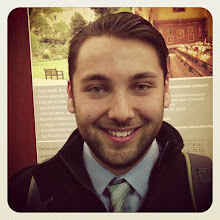I am still planning on filling you in on my day-trip to Roskilde last weekend, but for now I want to tell you about my trip to an accommodation center, where the Danish Government houses asylum seekers waiting to have their cases to become refugees accepted or rejected. It is located on the island of Amager (pronounces ama’ah, don’t ask me why) about one hour from central Copenhagen, by public transport. It houses families, as well as individuals, who have applied to the Danish government to be granted refugee status (as protected by the Geneva Conventions). Before that status is granted, they are considered asylum seekers, and are therefore not allowed to work for a salary. They are granted a small daily allowance to care for themselves, as well as housing, some education (mostly for children), as well as medical care if they are sick. The accommodation centers are funded by the Danish government, but are managed and staffed by the Danish Red Cross.
I traveled to the center with a reporter from New Times, himself an asylum seeker from Northern Africa, who introduced me and two of my class mates to several middle eastern asylum seekers who live at the center. We video-recorded some of the interviews, to eventually be uploaded to the New Times website, but several of the Iraqi asylum seekers were not comfortable being taped, due to the governments recent treatment of asylum seekers from Iraq. Many of these people left Iraq over ten years ago, because they were in danger of the Ba'ath government. However, now that there is a new government in Iraq, the Danish government believes that the asylum seekers no longer have a valid case to become refugees. Many of their cases have been denied, and the Iraqis are required to leave the country. Recently, a group of rejected asylum seekers took refuge in a church in Copenhagen, because they feared to return to their homes, and they were forcefully removed and deported by the police. The Danish government signed an agreement with the Iraqi government, which threatened the Iraqi’s with withholding aid if the asylum seekers were not taken back. According to the asylum seekers I met today, of the Iraqis who have already been deported, most of them were either arrested by the Iraqi government, or taken by terrorist groups. Their whereabouts are unknown, and they have not contacted their friends and families back in Denmark, where many of them have lived for the last ten years.
There is some frustration among the Danish people with their government’s treatment of asylum seekers, and foreigners in general. Since 2001, a right-of-center party has controlled the Danish parliament, with significant support from a conservative party, as well as from a far-right nationalist party, known as the Danish People’s Party. From what I have learned and read, this party is primarily focused on slowing, stopping, or even eliminating immigrants from Denmark, but run on a populist part platform that appeals to the poorer, less-educated, and generally those who are not familiar or comfortable with foreigners, because they do not have any contact with them. This party is especially hostile towards Muslims, and has recently proposed a ban on wearing a burka in Denmark. On of this party’s slogans is “Denmark for Danes.” They currently hold about 15% of the vote, which may seem small, but in a multi-party parliamentary system where there is a minority ruling coalition, they hold a lot of power. Because the governing coalition government does not hold a majority of votes, they must rely on other parties for support, and this has pushed many of the policies of Denmark to the right in recent years.
Overall, it was an interesting trip, and I met several interesting refugee-seekers, each with a story to tell. Many of them did not intend to end-up in Denmark, but were caught trying to travel to Sweden which has a much more liberal refugee-policy. Some of the have lived here for ten years, and are still waiting to have their cases heard by the Immigration board. I met a Kurdish man from Syria who, because of his ethnicity, does not have citizenship in any country, nor do his two children, both of whom were born in Denmark. I met a Palestinian-Christian many from Lebanon who fled religious persecution, and has several times attempted to take his life in his short time in Denmark. I also met several Iraqi’s both Arab and Kurdish, who fear to go back to their homes because of violence, and because Denmark is now their home, where they have friends and family. Most of them had no idea when their cases would be heard, and all they can do is wait for the final word, which decided whether or not they will be allowed to live in Denmark, or be deported.
I leave you with a link to a website I found several months ago, when researching my study abroad in Denmark. It is an open letter to the then President-Elect Barack Obama from Jacob Holdt and Rune Engelbreth Larsen, a Danish photographer and a writer and political commentator. They believe that because the world will be looking to Denmark in December for the climate change summit, attention should be drawn to some of the more fanatical elements of this party, which many are beginning to compare with the anti-Semitism that plagued in Europe seventy years ago.
Please follow this link to read the text, and to see the video.
